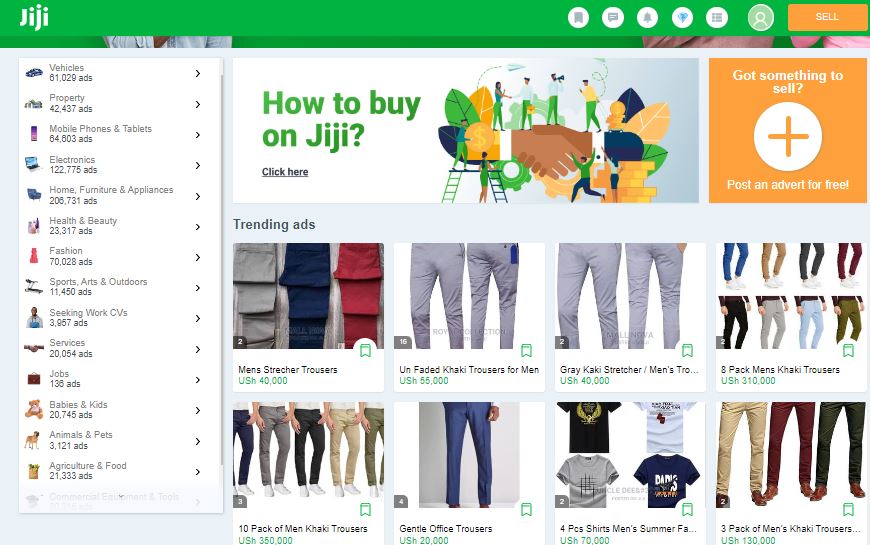Navigating the Digital Marketplace: A Comprehensive Look at Uganda’s Online Shopping Landscape
Related Articles: Navigating the Digital Marketplace: A Comprehensive Look at Uganda’s Online Shopping Landscape
Introduction
With enthusiasm, let’s navigate through the intriguing topic related to Navigating the Digital Marketplace: A Comprehensive Look at Uganda’s Online Shopping Landscape. Let’s weave interesting information and offer fresh perspectives to the readers.
Table of Content
Navigating the Digital Marketplace: A Comprehensive Look at Uganda’s Online Shopping Landscape

Uganda’s online shopping scene has witnessed a remarkable evolution, transforming from a nascent concept to a vibrant and dynamic ecosystem. This transformation reflects the increasing adoption of internet and mobile technology, coupled with the growing demand for convenience and accessibility in purchasing goods and services. This article delves into the intricacies of Uganda’s online shopping landscape, exploring its key players, benefits, and challenges, while also offering insights into the future of e-commerce in the country.
The Rise of E-Commerce in Uganda
The emergence of online shopping in Uganda can be attributed to several factors:
- Increased Internet Penetration: Uganda boasts a rapidly growing internet user base, with mobile internet playing a significant role. This accessibility has paved the way for online platforms to flourish.
- Smartphone Proliferation: The widespread adoption of smartphones has empowered consumers with the ability to access the internet and online shopping platforms on the go.
- Evolving Consumer Preferences: Ugandan consumers are increasingly seeking convenience, variety, and competitive pricing, which online shopping platforms offer.
- Government Initiatives: The Ugandan government has implemented policies and initiatives to foster e-commerce growth, including promoting digital literacy and creating a conducive regulatory environment.
Key Players in Uganda’s Online Shopping Landscape
The Ugandan e-commerce market is characterized by a diverse range of players, catering to various consumer needs and preferences. These players can be broadly categorized into:
1. Marketplace Platforms:
- Jumia Uganda: A leading pan-African e-commerce platform offering a wide range of products, including electronics, fashion, home appliances, and groceries. Jumia is known for its competitive pricing, diverse selection, and convenient delivery options.
- Kilimall: Another prominent marketplace platform, Kilimall offers a vast selection of products from various categories, including electronics, fashion, home décor, and personal care items.
- Bid or Buy: This platform provides a unique online auction experience, allowing buyers to bid on a variety of products and services.
- OLX Uganda: A classifieds platform that allows users to buy and sell a wide range of products, from electronics and furniture to vehicles and real estate.
2. Specialized E-commerce Stores:
- The Uganda Online Shop: Specializing in a wide range of products, including electronics, fashion, and home goods, this platform focuses on providing a curated selection of quality items.
- Shopit: This platform caters specifically to the needs of Ugandan businesses, offering a range of services, including online store setup, payment processing, and marketing solutions.
- UgandaMart: A platform dedicated to offering a wide selection of local products, supporting Ugandan entrepreneurs and promoting local businesses.
3. Social Media Commerce:
- Facebook Marketplace: A popular platform for buying and selling goods within local communities, Facebook Marketplace offers a convenient and accessible option for individuals and businesses.
- WhatsApp Groups: Many online shopping groups operate on WhatsApp, facilitating transactions and connecting buyers and sellers.
Benefits of Online Shopping in Uganda
The rise of online shopping in Uganda brings numerous advantages for both consumers and businesses:
For Consumers:
- Convenience: Online shopping eliminates the need for physical store visits, saving time and effort. Consumers can browse and purchase products from the comfort of their homes or on the go.
- Wider Selection: Online platforms offer a vast selection of products from various brands and retailers, providing consumers with a wider range of choices.
- Competitive Pricing: Online retailers often offer competitive prices due to reduced overhead costs and increased competition.
- Easy Comparison: Consumers can easily compare prices and features of different products across multiple platforms, ensuring they make informed purchasing decisions.
- Secure Payment Options: Most online platforms offer secure payment gateways, allowing consumers to make transactions with confidence.
- Delivery Options: Online retailers provide convenient delivery options, including same-day delivery, next-day delivery, and scheduled delivery, catering to diverse consumer needs.
For Businesses:
- Expanded Reach: Online platforms allow businesses to reach a wider customer base beyond their physical store locations, expanding their market reach and customer base.
- Reduced Costs: Online businesses can operate with lower overhead costs compared to traditional brick-and-mortar stores, leading to increased profitability.
- Enhanced Customer Engagement: Online platforms provide opportunities for businesses to engage with customers through interactive features, personalized recommendations, and customer support channels.
- Data Analytics: Online platforms provide businesses with valuable data insights into customer behavior, purchase patterns, and market trends, enabling informed decision-making.
- Global Market Access: Online platforms offer businesses the potential to tap into global markets, expanding their reach and customer base beyond national boundaries.
Challenges Facing Online Shopping in Uganda
Despite its significant growth, online shopping in Uganda faces several challenges:
- Limited Internet Access: While internet penetration is increasing, access remains limited in rural areas, hindering the widespread adoption of online shopping.
- Payment Gateway Issues: Limited availability of secure and reliable payment gateways poses a barrier for both consumers and businesses, hindering online transactions.
- Trust and Security Concerns: Concerns about online fraud and data security can deter consumers from engaging in online shopping.
- Logistical Challenges: Delivery infrastructure in Uganda is still developing, leading to challenges in ensuring timely and reliable delivery of goods.
- Lack of Awareness and Digital Literacy: Limited awareness and digital literacy among consumers can hinder the adoption of online shopping.
FAQs by Ugandan Online Shopping Sites
1. What are the most popular payment methods on Ugandan online shopping sites?
Popular payment methods on Ugandan online shopping sites include mobile money (e.g., MTN Mobile Money, Airtel Money), bank transfers, credit/debit cards, and cash on delivery.
2. How secure are online payments on Ugandan e-commerce platforms?
Most reputable online shopping platforms in Uganda utilize secure payment gateways that encrypt sensitive data, minimizing the risk of fraud. However, it is crucial to choose trusted platforms and avoid suspicious websites.
3. What is the average delivery time for online orders in Uganda?
Delivery times vary depending on the location, product, and the chosen delivery option. However, most platforms offer same-day or next-day delivery within major urban areas. Delivery to remote areas may take longer.
4. What are the return and refund policies on Ugandan online shopping sites?
Return and refund policies vary across different platforms. It is essential to review the specific policies of each platform before making a purchase to understand the terms and conditions for returns and refunds.
5. How can I track my online order in Uganda?
Most online shopping platforms provide order tracking features, allowing customers to monitor the status of their orders in real-time. Tracking information is typically available via email or through the platform’s website or mobile app.
Tips by Ugandan Online Shopping Sites
- Choose Reputable Platforms: Select well-established and reputable online shopping platforms with a proven track record of customer satisfaction.
- Read Reviews and Ratings: Check customer reviews and ratings to gauge the reliability and trustworthiness of the platform and its sellers.
- Compare Prices and Features: Compare prices and features of different products across multiple platforms to ensure you are getting the best value for your money.
- Verify Seller Information: Ensure the seller’s information is legitimate and contact details are available for any inquiries or concerns.
- Use Secure Payment Methods: Choose secure payment gateways offered by the platform and avoid using public Wi-Fi networks for online transactions.
- Check Delivery Options and Costs: Review delivery options and costs before completing your purchase, ensuring you understand the estimated delivery time and any additional fees.
- Read the Terms and Conditions: Thoroughly read the terms and conditions, including return and refund policies, before making a purchase.
- Keep Transaction Records: Save copies of all transaction records, including order confirmation emails and payment receipts, for future reference.
Conclusion by Ugandan Online Shopping Sites
Uganda’s online shopping landscape is evolving rapidly, offering both consumers and businesses unprecedented opportunities. The growth of e-commerce is driven by factors like increased internet penetration, smartphone adoption, and a growing demand for convenience and accessibility. However, challenges such as limited internet access, payment gateway issues, and logistical hurdles need to be addressed to ensure the continued growth and sustainability of this sector. As technology advances and infrastructure improves, the future of online shopping in Uganda looks promising, with the potential to transform the country’s retail landscape and empower businesses and consumers alike.







Closure
Thus, we hope this article has provided valuable insights into Navigating the Digital Marketplace: A Comprehensive Look at Uganda’s Online Shopping Landscape. We appreciate your attention to our article. See you in our next article!